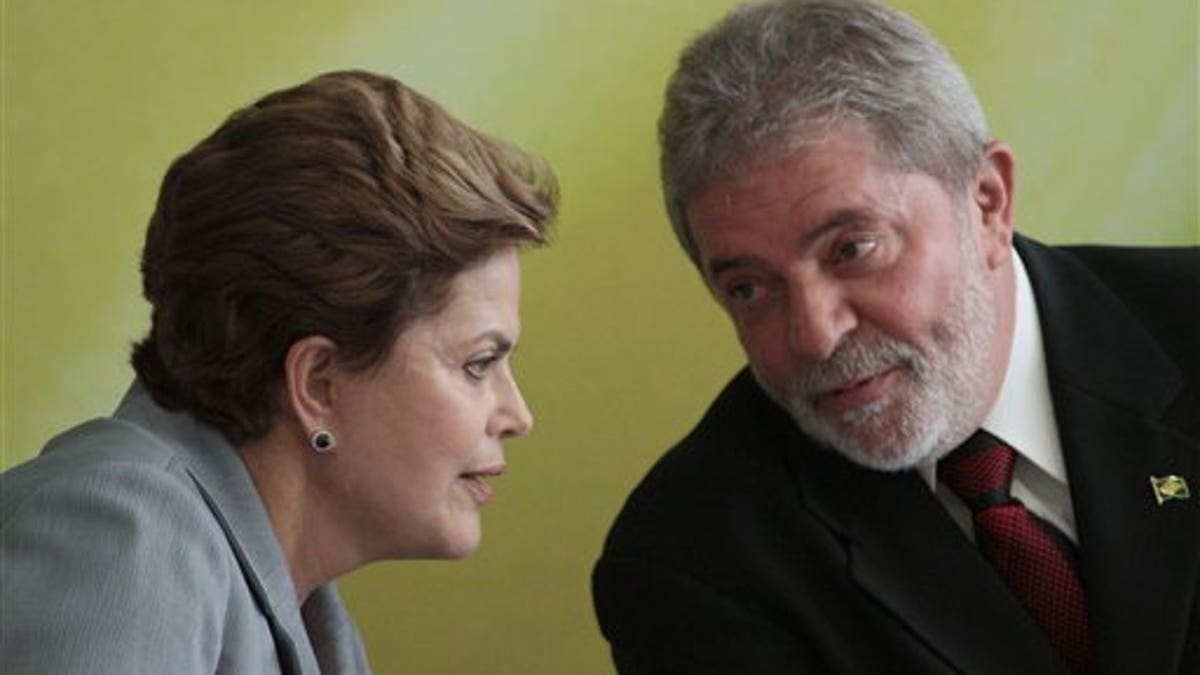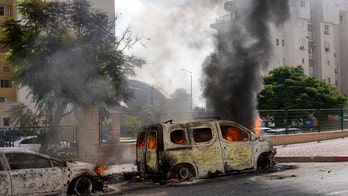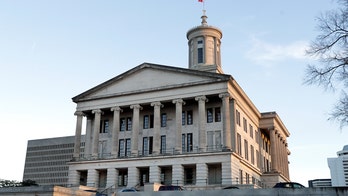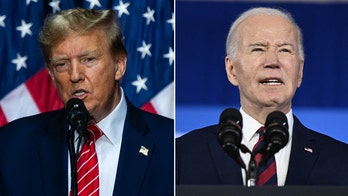
Brazil's President-elect Dilma Rousseff talks with President Luiz Inacio Lula da Silva during an event where Lula da Silva spoke of his eight-year administration at the presidential palace in Brasilia, Brazil, Wednesday Dec. 15, 2010. (AP Photo/Eraldo Peres) (AP2010)
Brazil is swearing in a new president -- and her story is anything but ho-hum.
A former Marxist guerrilla who was tortured under Brazil's dictatorship as a student rebel will become the first female president of Latin America's largest nation when she is sworn in Saturday.
Dilma Rousseff takes the presidency from Luiz Inacio Lula da Silva, her political mentor who used his enormous popularity to help propel her to the presidency. It's been a remarkable rise for a woman who less than a year ago was a little-known career technocrat who never before held elected office.
Tens of thousands of Dilma supporters arrived in the capital, Brasilia, early Saturday, waving banners, sporting Dilma T-shirts and painting their faces in the bright red color that represents the ruling Workers Party.
Rousseff inherits a nation on the rise. In the eight years under Silva, Brazil has sharply cut poverty while its economy has boomed, and it has increased its political clout on the global stage. Brazil will host the 2014 World Cup and is expected to be the world's fifth-largest economy by the time the 2016 Olympics come to the nation.
But huge challenges also await Rousseff, who served as Silva's energy minister before becoming his chief of staff, where her tough managerial manner earned her the moniker "Iron Lady." In addition to sweeping improvements Brazil needs in its infrastructure, security and education, she confronts the danger of following the charismatic Silva, who leaves office with an 87 percent approval rating.
"Dilma will have to meet high expectations that the country is on an upward trajectory and life will continue to get better for the average Brazilian," said Michael Shifter, president of the Inter-American Dialogue. "That will not be an easy challenge."
Shifter said it could prove difficult for Brazil to maintain the pace of success it saw under Silva.
The external economic scenario could worsen, cutting into strong demand for Brazil's agricultural and industrial exports, particularly if anything should dampen China's growing appetite for Brazil's goods. The Asian nation this year passed the U.S. as Brazil's biggest trading partner.
And Rousseff will need a strong economy to improve the nation's woeful airports, ports, and roads -- all vital in transporting Brazil's raw goods to market and in hosting the World Cup and the Olympics -- events Brazilians hope will bolster their newfound image as a nation that gets things done.
Rousseff also will have to handle the unwieldy political coalitions required to govern Brazil. Silva, with his vast experience, his unique popularity and by sheer force of will was able to satisfy the leftist elements in his Workers Party, while at the same time employing orthodox economic policies to calm the business community that fretted early on about his socialist roots.
Rousseff, 63, lacks Silva's political acumen and charisma and it is not yet known if she will be able to command the far-flung components of the Workers Party while also keeping other factions happy in a coalition government.
But as Silva's hand-chosen successor, and a Cabinet member of his government from its start in 2003, Rousseff has the power of continuity going for her.
"Dilma represents a great novelty in Brazil," said Alexandre Barros, a political analyst with the Early Warning political risk group in Brasilia. "Before, every new government brought with it huge uncertainty. Everybody would shout about how Brazil was going to ruins. But now, with Rousseff, no. She represents what we've already seen."
The Associated Press contributed to this report.
Follow us on twitter.com/foxnewslatino
Like us at facebook.com/foxnewslatino




